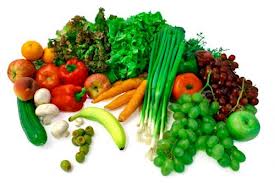Make cooked potatoes diet friendly by refrigerating them.
Health Benefits: Cook potatoes or other root vegetables, then chill them for about 24 hours before you eat them. The cooling process turns high-glycemic vegetables into low- or moderate-glycemic vegetables, and that transformation helps keep your blood sugar levels more stable. Even if you reheat the veggies, this trick works. As a bonus, cooking with extra-virgin olive oil helps keep the veggies from slowing down your metabolism.
Thaw your frozen berries in the microwave.
Health benefits: You’ll preserve twice as many antioxidants and more vitamin C if you do compared to defrosting on the counter or in the fridge. Frozen fruit and veggies have been shown to be better for you than fresh out-of-season produce, since they are picked and frozen when their nutrition is at their peak. Also: Berries are your fiber friends: Ounce per ounce, there is more fiber in raspberries than bran cereals!
Make your salad the day before you eat it.
Health benefits: Jo Robinson, author of the upcoming book Eating on The Wild Side, which reviewed thousands of health studies, explains that tearing romaine and iceberg lettuce the day before will quadruple its’ antioxidant content. Shred clean greens with your fingers, put in a plastic bag with a paper towel to absorb extra moisture, and keep in the fridge till the next day. Then toss with toppings.
Pick the yellowest ears of corn.
Health benefits: You’ll reap 35 times more beta-carotene than white corn! Beta-carotene, a precursor to vitamin A, contains powerful antioxidant functions.
Cook carrots whole.
Health benefits: Carrots are more nutritious cooked than raw! And when cooked whole, they have 25 percent more falcarinol, a cancer-fighting compound, than carrots that have been chopped beforehand.
Dice garlic, then let it rest.
Health benefits: Maximize this aromatic plant’s powerful medicinal qualities (cancer-fighting compounds, antioxidants, vitamin C) by chopping, mashing, or pressing it and allowing it to sit on the cutting board for 10 minutes before cooking.
Poke holes in your broccoli’s bag.
Health benefits: Storing broccoli wrapped in a plastic bag with tiny pricks in it will give you up to 125 percent more antioxidants than if you had stored the broccoli loosely wrapped or in a tightly sealed bag. Use a salad fork to get holes all over.
Make sure to thoroughly chew your grapefruit.
Health benefits: You’ll absorb more of the lycopene in pink grapefruit when you make sure to break all the cell walls.
Throw a chile into a corn dish.
Health benefits: This simple remedy for indigestion has been widely used for generations in Mexican culture, explains Chef Luis Aguilar Puente, since chiles help you digest corn. As an added bonus, one raw green chile has double the amount of vitamin C found in an orange.
Buy canned tomatoes over fresh.
Health Benefits: The most nutritious tomatoes in the supermarket aren’t in the produce aisle! Processed tomatoes are the richest known source of lycopene, because of their concentrated state. When buying fresh, look for smaller size and deeper color; you’ll get more nutrients. If you have a choice, deep red tomatoes have more antioxidants than yellow, gold, or green tomatoes.
Bake with avocados instead of butter.
Health benefits: Over 75 percent of the fat in the versatile “alligator pear” is unsaturated (monounsaturated and polyunsaturated fats, the good kinds) and they’ll bring nearly 20 vitamins, minerals, and phytonutrients to your baked goods.
Choose dark chocolate over milk chocolate.
Health benefits: Numerous studies have shown that dark chocolate (above 70 percent cacao) can lower bad cholesterol, decrease blood pressure, reduce inflammation, and help you lose weight.
Make leafy greens more potent with a squeeze of lemon.
Health benefits: Frances Diaz, RD of FITzee Foods shares,”Vegetables like spinach, broccoli, and kale contain lots of iron, but it’s in an indigestible form. So adding Vitamin C to these foods will help your body break it down in to a form that is more easily absorbed by our bodies.” Try lemon, lime, or orange.
Store asparagus like roses.
Health benefits: Store asparagus upright in a small vase or bowl in your fridge to keep its metabolic activity going, and you’ll prevent spoilage while keep the veggies fresher and more antioxidant-rich.
Boil and drain your Swiss chard, beet tops, and spinach before eating.
Health benefits: Doing so frees up acids that are linked to certain types of kidney stones formation, according to nutritionist Nicolette M. Pace, MS, RD.
Rub the skin of kumquats before you pop them in your mouth.
Health benefits: It’s worth finding kumquats to try this out; limonene has been shown in studies to have anti-cancer effects. Aim for about five to get a good dose of vitamin C, carotenes, and lutein; and eat them whole (peel and all) to reap their full nutritional benefits.
Let your lentils sprout.
Health benefits: When legumes like beans and lentils sprout, the grain’s starchiness lowers, and the protein content rises. (Learn how to do it yourself here.) This process not only makes them more nutritious, but also appears to make them more easily digested.
Make beets bite size before cooking.
Health benefits: Cutting beets into chunks or cooking the smallest ones you can find will aid in keeping their nutrient levels high, since you can reduce cook time (the rich betalin color is highly susceptible to nutrient losses with extended exposure to heat). Try for 15 minutes when steaming, and 45 max when roasting.
Make your salad a day in advance to up your antioxidants.
Tearing romaine and iceberg lettuce the day before quadruples the antioxidant content, according to the thousands of scientific studies reviewed by author of the new book Eating on the Wild Side. Shred clean greens with your fingers, put in a plastic bag with a paper towel to absorb extra moisture, and keep in the fridge till the next day. Then toss with your favorite toppings.
